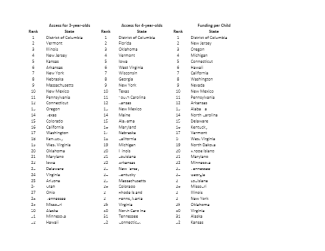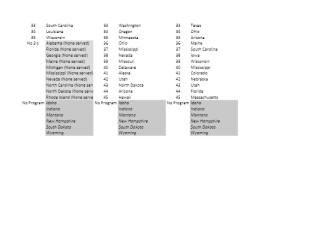
Back to School 2023
Top States for Preschool Education

August 24, 2023
NIEER Report Identifies Best States for Free Public Preschool as Children Go Back to School
NEW BRUNSWICK, NJ – As young children across the country start to go back to school—whether they start school at all and the educational quality they can expect varies dramatically by state. This is particularly crucial because preschool education, with its proven ability to enrich child development and lay the foundation for lifelong success, often comes at a substantial financial cost for families.
In a few states, many families have the opportunity to enroll their children in free, publicly funded preschool education starting at age three. More states offer every child free access at age four, and in about 10 states, most children will be able to enroll in free, state-funded preschool at age four. This fall, we expect record enrollments in a handful of states–California, Colorado, Hawaii, and New Mexico–that have joined others with legislation to create universal preschool programs. However, it’s essential to note that even states with longstanding commitments to providing every child with a preschool education may still have significant strides to make in turning this aspiration into a tangible reality. Moreover, how much states are willing to spend to support a quality education for each child differs greatly among the states.
To provide a guide to how well each state supports preschool education for parents and others, we have compiled rankings based on a national survey of state programs for the 2021-22 school year. All but six states offer free preschool education regardless of parents’ employment status at least at age four; these six states are—Idaho, Indiana, Montana, New Hampshire, South Dakota, and Wyoming—tie for last place in our best places to start preschool for both access and funding.
We present three rankings from best to worst, one each for:
Opportunity for Enrollment at Age Three (Two Years of State-Funded Preschool Education):
This ranking assesses the extent to which states provide opportunities for children to enroll in state-funded preschool education starting at age three as 35 states that serve three-year-olds, the other states tie for last place.
Opportunity for Enrollment at Age Four (One Year of State-Funded Preschool Education):
This ranking evaluates the accessibility of state-funded preschool education for children at the age of four.
State Spending per Child Enrolled (a Key Determinant of Quality and Hours):
This ranking assesses how much each state is willing to invest per child enrolled in state-funded preschool programs, adjusting for state cost of living, a pivotal factor influencing educational quality and the number of hours of services provided, which can range from just 10 hours per week for 36 weeks to full-day, year-round services.
These rankings draw upon enrollment data from the 2021-22 academic year, encompassing both age three and age four enrollments. Additionally, they are adjusted to account for state-specific variations in the cost of living, ensuring a fair and accurate assessment of each state’s performance.
Although not a state, Washington, DC, is treated as such in federal education data. In our rankings, Washington, D.C., emerged as the premier destination for young children to embark on their preschool journey, leading in all three categories.
Rounding out the top five states in each category were: For Access at Age Three— Washington, D.C., Vermont, Illinois, New Jersey, and Kansas; For Access at Age Four— Washington, D.C., Florida, Oklahoma, Vermont, and Iowa; For State Spending per Child — Washington, D.C., New Jersey, Oregon, Michigan, and Connecticut.
This study was supported with funding from the Heising-Simons Foundation. For more information and detailed state-by-state profiles on quality, access, and funding, please visit nieer.org.
The National Institute for Early Education Research at the Rutgers Graduate School of Education, New Brunswick, NJ, supports early childhood education policy and practice through independent, objective research and the translation of research to policy and practice.


The Authors
W. Steven (Steve) Barnett is a Board of Governors Professor and the founder and Senior Co-Director of the National Institute for Early Education Research (NIEER) at Rutgers University. Dr. Barnett’s work primarily focuses on public policies regarding early childhood education, child care, and child development.
Kate is an Early Childhood Education Policy Specialist at NIEER, where she primarily focuses on state and national policy analysis. Her current work includes collecting, analyzing, and disseminating data for the annual State of Preschool Yearbook report, providing technical assistance to New Jersey school districts and private providers applying for and implementing the state-funded preschool program, among other projects.
About NIEER
The National Institute for Early Education Research (NIEER) at the Graduate School of Education, Rutgers University, New Brunswick, NJ, conducts and disseminates independent research and analysis to inform early childhood education policy.


